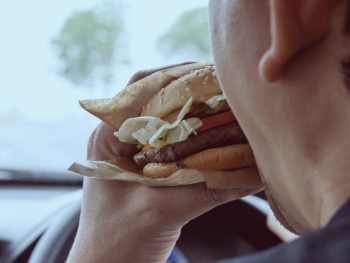Drivers who stop for lunch during their working day and leave their engines running – dubbed ‘McIdling’ – could be racking up hundreds of pounds a year in unnecessary fuel bills while they eat, Lightfoot has warned.
 The fleet technology specialist’s in-cab driver coaching device monitors when vans are idling, and when paired with telematics, can show where too.
The fleet technology specialist’s in-cab driver coaching device monitors when vans are idling, and when paired with telematics, can show where too.
Analysis of the data shows the place where idling is at its most prevalent is in fast food restaurant car parks over lunchtimes, with plumbers, electricians, couriers and builders leaving their engines running for heating or air con.
Lightfoot’s technology has detected the issue of McIdling during the ‘blind’ phase in the customer onboarding process. During this period, the installed devices operate in data collection mode, passively recording insights on driving habits without providing coaching.
This data establishes a baseline for key metrics, such as carbon and NOx emissions, MPG, EV range, and fleet safety.
When customers transition to the live phase, the device is activated to provide real-time driver coaching, improving driving behaviour and enhancing these baseline metrics while reducing unnecessary idling and preventing harsh events. This transition also enables accurate measurement of improvements across the fleet.
McIdling (other fast food restaurants are available!) may seem innocuous, but according to Lightfoot’s data, a diesel van left running for an hour will use around a litre of fuel – costing approximately £1.25 (excluding VAT), at current pump prices.
If a driver does this every working day (based on 240 working days – five days a week for 48 weeks) to keep heating or air con operating they will use around £300 (excluding VAT) of fuel a year just while they’re on their lunch break. That’s equivalent to more than 2,000 miles at 35mpg, or around four tankfuls of diesel for a medium panel van.
Lightfoot managing director Paul Hollick said: “Our data shows that the fast food car park, especially at lunchtime, is a major hotspot for idling. And if it’s not stopped, it could be costing employers thousands of pounds a year while all their drivers to stop and have lunch.
“If a driver sits in their cab eating a Big Mac Meal, and leaves the van idling while they do it, the cost of that lunch goes up from £7.10 to £8.35 with the extra fuel used. That can really add up over the course of the year.”
Hollick added that idling for an hour creates around 2.7kg of CO2 emissions, or 0.6 tonnes per year, based on 240 working days per annum.
“We see that businesses are trying really hard to decarbonise, through better driving, better route planning, more efficient vehicles and electrification, yet it can all be wasted by not policing instances of idling such as this,” he remarked.
Lightfoot’s in-cab technology plugs into a port in the van’s CAN bus so that it can monitor and record when it is idling, and provide the driver with real-time feedback through in-cab warnings, as well as warning of penalties for leaving the engine on unnecessarily.
Lightfoot devices will significantly reduce idling instances for fleets, and not just in fast food restaurant car parks. Other hot spots include leaving the engine running while stopped in traffic jams or, with auto stop-start disabled, parked up while the driver is out of the cab working.
“McIdling is one of a number of behaviours that cost money and create pollution that Lightfoot can stop. The fact we can warn drivers about it as they tuck into their Big Mac, Zinger, Whopper, or even Pret baguette, means they can ensure they save as much money as possible,” said Hollick.

